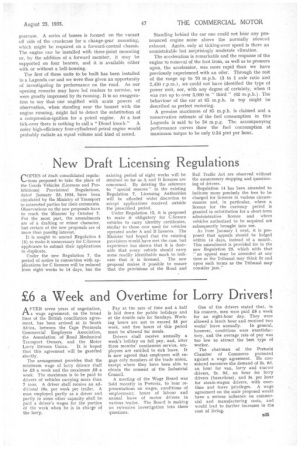£6 a Week and Overtime for Lorry Drivers!
Page 45

If you've noticed an error in this article please click here to report it so we can fix it.
A FTER seven years of negotiation,
a wage agreement, on the broad lines of the British conciliation agreement, has been arrived at in South Africa, between the Cape Peninsula Commercial Employers Association, the Association of Road Mechanical Transport Owners, and the Motor Lorry Drivers Union. It is hoped that this agreement will be gazetted shortly.
The arrangement provides that the minimum wage of lorry drivers shall be £3 a week and the maximum £6 a week, The maximum is to be paid to drivers of vehicles carrying more than 7 tons. A driver shall receive an additional 10s. per week per trailer, A man employed partly as a driver and partly in some other capacity shall be paid a driver's wages for the portion of the week when he is in charge" of the lorry.
Pay at the rate of time and a half is laid down for public holidays and at the double rate for Sundays. Working hours are not to exceed 65 per week, and five hours of this period must be allowed for meals.
Drivers shall receive annually a week's holiday on full pay, and, after three months' continuous service, employees are entitled to sick leave. It is now agreed that employers will engage only members of the trade union, except where they have been abia to obtain the consent of the Industrial Council.
A meeting of the Wage Board was held recently in Pretoria, to hear representations on wages, conditions of employment; hours of labour and annual leave of motor drivers in various trades, The Board is making an extensive investigation into these questions. One of the drivers stated that, in
his concern, men were paid a week for an eight-hour day. They were allowed a lunch hour and received two weeks' leave annually. In general, however, conditions were unsatisfactory, and the average rate of pay was too low to attract the best type of worker.
The chairman of the Pretoria Chamber of Commerce protested against a wage agreement. He considered excessive the demand of 2s. 6d. an hour for van, lorry and tractor drivers, 2s. 9d. an hour for lorry drivers (hazardous), and 3s. per hour for steam-wagon drivers, with overtime and leave privileges. A wage agreement on the scale proposed would have a serious influence on commercial and manufacturing costs, and would lead to further increases in the cost of living.




















































































